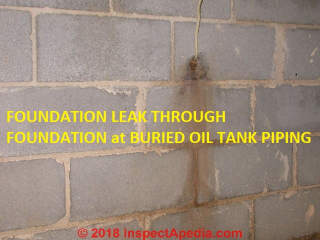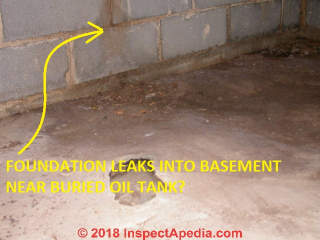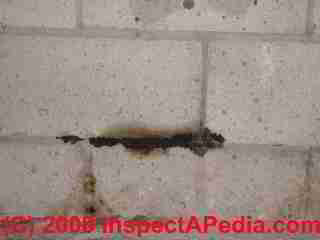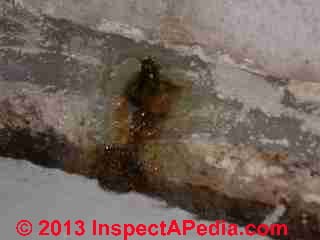 Buried Tanks Cause Wet Basement or Crawl Area
Buried Tanks Cause Wet Basement or Crawl Area
How buried oil tanks or septic tanks contribute to water entry
- POST a QUESTION or COMMENT about troubleshooting wet basements: finding outside sources of water leakage
Buried components near the building foundation can cause or increase foundation leaks and wet basements or crawl areas.
When roof spillage or surface runoff land near a building foundation wall, objects buried close to the structure, such as a buried oil tank or septic tank or even a large boulder or in-sloping solid rock, or even burrows from a gopher or groundhog all form a ready cavity or hole that helps catch and accumulate water that then can penetrate the foundation wall or leak up through the basement or crawl space floor.
InspectAPedia tolerates no conflicts of interest. We have no relationship with advertisers, products, or services discussed at this website.
- Daniel Friedman, Publisher/Editor/Author - See WHO ARE WE?
Buried Septic Tank or Oil Tank Near Foundation Contributes to Water Entry
 Question: could my buried oil tank be causing basement water entry?
Question: could my buried oil tank be causing basement water entry?
2019/02/06 Maggie said:
I have an underground oil tank, not used for 30 years. I didn’t know it was there when I bought the house. It is buried in the driveway.
A leak in the basement has been going on for a few years. Now that I know the tank is on the other side of the wall. Is the tank causing the leak in the basement? Thank you
This question and reply were posted originally
[Click to enlarge any image]
Reply: Why Water Leaks Through a Foundation Wall Near a Buried Oil Tank
Maggie
I would not say the tank is the prime or only cause of basement water entry but there is no doubt that an oil tank buried close to a building wall can contribute to water entry through or under the foundation wall in that area. I have personally seen and verified that phenomenon.
Watch out: If you see basement or crawl space water entry and if you see that there is a wet area along a foundation wall that is localized and that appears to be in the same location as an outdoor object that is buried close to the building, that's a strong suggestion that the excavation for the buried oil tank, septic tank, boulder, or other object is serving as a water catchment that collects and aims water at the building.
The oily stain in th the mortar joint in the concrete block foundation wall shown above was a telltale indicator of an improperly abandoned oil storage tank outside the wall. The tank had leaked oil.
Our photo below, taken at the same location but close to the crawl space floor, shows active water entry along with old heating oil.
How a buried septic tank or oil tank close to a foundation contributes to localized water entry
- There is a water source near the building foundation wall, usually roof gutter overflow, spillage, or a downspout not directed away from the home, occasionally in-slope grade towards the wall, and very rarely, an underground water source.
- Water isn 't being directed away from the building because of defects in point No. 1
- Water filters down through soil, hits the original excavation made for the buried tank, finding a more-easy path downwards towards the foundation that it would in nearby areas that don't have a ready excavation and object buried near the building.
- Enough water accumulates to overwhelm a footing drain (if present and if still working after 30+ years, which would be rare);
- Accumulated outside water finds its way inside through the foundation wall or under the wall and up at the floor/wall joint inside.
Watch out: water from roof spillage or surface runoff will also follow trenches dug to route piping such as oil piping from a buried oil tank (shown below) and also buried water entry lines or sewer lines or buried electrical wiring.
How to Stop Foundation Leaks Near Buried Oil Tanks, Septic Tanks, Boulders, etc.
You do not normally have to remove the buried object, and in fact doing so risks leaving a new excavation of less-compacted soil that sill catches water and aims it at the foundation wall.
- Fix the roof drainage. The solution to this problem is usually as simple as fixing and maintaining the roof gutters and downspouts. Be sure the downspout empties more than 10 ft. from the building and into an area that continues to drain away.
See details at GUTTERS & DOWNSPOUTS - Fix surface grading: On occasion we also need to re-grade around the building to direct surface runoff away from the structure.
See details at GRADING, DRAINAGE & SITE WORK - Desperate measures: Rarely we need to remove the buried object, fill and compact soil in the hole, or pump bentonite clay around the foundation wall.
See BASEMENT WATERPROOFING for more suggestions.
You should also check the following:
- Is the oil tank empty?
- If the buried oil tank was not properly abandoned (by emptying it and filling it with sand) it should be so treated.
See OIL TANK ABANDONING PROCEDURE - Did the oil tank leak oil?
Confirm by test and inspection that there is no oil in the tank
See OIL TANK LEAK TEST METHODS - If the underground tank leaked oil it'll need to be removed and the contaminated soil removed
See OIL TANK LEAK TEST METHODS
For more examples of building oil or water leaks traced to a buried oil tank see
For clues indicating that there may be a buried oil tank near a building see
For a discussion of just how close a septic tank may be to a building see
CLEARANCE DISTANCES, SEPTIC SYSTEM
If you see animal or other holes in the ground surface near the point of water entry
This article series discusses methods for preventing wet basements by attention to multiple best construction practices, including the basics of foundation damp proof coating or waterproofing, poor site drainage, bentonite clay for basement waterproofing, foundation membranes to prevent leakage, foundation drain tiles, proper backfill, and proper finish grading.
...
Continue reading at EXTERIOR WATER SOURCE ELIMINATION or select a topic from the closely-related articles below, or see the complete ARTICLE INDEX.
Or see these
Recommended Articles
Or see these
Basement / Crawl Area Dry-Out Articles
- BASEMENT DE-WATERING SYSTEMS
- BASEMENT LEAKS, INSPECT FOR
- BASEMENT WATERPROOFING
- CRAWL SPACE DRYOUT
- EFFLORESCENCE SALTS & WHITE DEPOSITS
- FLOOD DAMAGE ASSESSMENT, SAFETY & CLEANUP
- FOUNDATION WATERPROOFING
- FOUNDATION WATERPROOFING: CRACK SEALANTS
- FOUNDATION WATERPROOFING SEALANTS
- GEOTEXTILES & DRAINAGE MATS
- GRADING, DRAINAGE & SITE WORK
- PLUMBING LEAK DETECTION & SHUTOFF DEVICES
- WATER BARRIERS, EXTERIOR BUILDING
- WATER ENTRY FROM BURIED TANKS
- WATER ENTRY in BUILDINGS - home
- WET BASEMENT PREVENTION
- WET, DEFINITION OF
Suggested citation for this web page
WATER ENTRY FROM BURIED TANKS at InspectApedia.com - online encyclopedia of building & environmental inspection, testing, diagnosis, repair, & problem prevention advice.
Or see this
INDEX to RELATED ARTICLES: ARTICLE INDEX to BUILDING LEAKS & WATER ENTRY
Or use the SEARCH BOX found below to Ask a Question or Search InspectApedia
Ask a Question or Search InspectApedia
Questions & answers or comments about troubleshooting wet basements: finding outside sources of water leakage.
Try the search box just below, or if you prefer, post a question or comment in the Comments box below and we will respond promptly.
Search the InspectApedia website
Note: appearance of your Comment below may be delayed: if your comment contains an image, photograph, web link, or text that looks to the software as if it might be a web link, your posting will appear after it has been approved by a moderator. Apologies for the delay.
Only one image can be added per comment but you can post as many comments, and therefore images, as you like.
You will not receive a notification when a response to your question has been posted.
Please bookmark this page to make it easy for you to check back for our response.
IF above you see "Comment Form is loading comments..." then COMMENT BOX - countable.ca / bawkbox.com IS NOT WORKING.
In any case you are welcome to send an email directly to us at InspectApedia.com at editor@inspectApedia.com
We'll reply to you directly. Please help us help you by noting, in your email, the URL of the InspectApedia page where you wanted to comment.
Citations & References
In addition to any citations in the article above, a full list is available on request.
- In addition to citations & references found in this article, see the research citations given at the end of the related articles found at our suggested
CONTINUE READING or RECOMMENDED ARTICLES.
- Carson, Dunlop & Associates Ltd., 120 Carlton Street Suite 407, Toronto ON M5A 4K2. Tel: (416) 964-9415 1-800-268-7070 Email: info@carsondunlop.com. Alan Carson is a past president of ASHI, the American Society of Home Inspectors.
Thanks to Alan Carson and Bob Dunlop, for permission for InspectAPedia to use text excerpts from The HOME REFERENCE BOOK - the Encyclopedia of Homes and to use illustrations from The ILLUSTRATED HOME .
Carson Dunlop Associates provides extensive home inspection education and report writing material. In gratitude we provide links to tsome Carson Dunlop Associates products and services.



